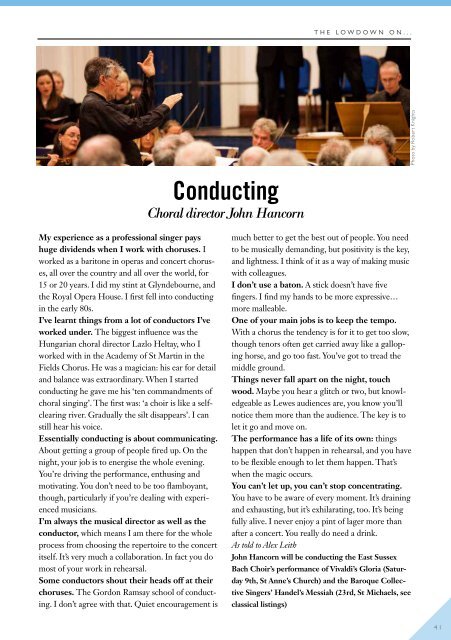Viva Lewes Issue #135 December 2017
Create successful ePaper yourself
Turn your PDF publications into a flip-book with our unique Google optimized e-Paper software.
THE LOWDOWN ON...<br />
Photo by Robert Knights<br />
Conducting<br />
Choral director John Hancorn<br />
My experience as a professional singer pays<br />
huge dividends when I work with choruses. I<br />
worked as a baritone in operas and concert choruses,<br />
all over the country and all over the world, for<br />
15 or 20 years. I did my stint at Glyndebourne, and<br />
the Royal Opera House. I first fell into conducting<br />
in the early 80s.<br />
I’ve learnt things from a lot of conductors I’ve<br />
worked under. The biggest influence was the<br />
Hungarian choral director Lazlo Heltay, who I<br />
worked with in the Academy of St Martin in the<br />
Fields Chorus. He was a magician: his ear for detail<br />
and balance was extraordinary. When I started<br />
conducting he gave me his ‘ten commandments of<br />
choral singing’. The first was: ‘a choir is like a selfclearing<br />
river. Gradually the silt disappears’. I can<br />
still hear his voice.<br />
Essentially conducting is about communicating.<br />
About getting a group of people fired up. On the<br />
night, your job is to energise the whole evening.<br />
You’re driving the performance, enthusing and<br />
motivating. You don’t need to be too flamboyant,<br />
though, particularly if you’re dealing with experienced<br />
musicians.<br />
I’m always the musical director as well as the<br />
conductor, which means I am there for the whole<br />
process from choosing the repertoire to the concert<br />
itself. It’s very much a collaboration. In fact you do<br />
most of your work in rehearsal.<br />
Some conductors shout their heads off at their<br />
choruses. The Gordon Ramsay school of conducting.<br />
I don’t agree with that. Quiet encouragement is<br />
much better to get the best out of people. You need<br />
to be musically demanding, but positivity is the key,<br />
and lightness. I think of it as a way of making music<br />
with colleagues.<br />
I don’t use a baton. A stick doesn’t have five<br />
fingers. I find my hands to be more expressive…<br />
more malleable.<br />
One of your main jobs is to keep the tempo.<br />
With a chorus the tendency is for it to get too slow,<br />
though tenors often get carried away like a galloping<br />
horse, and go too fast. You’ve got to tread the<br />
middle ground.<br />
Things never fall apart on the night, touch<br />
wood. Maybe you hear a glitch or two, but knowledgeable<br />
as <strong>Lewes</strong> audiences are, you know you’ll<br />
notice them more than the audience. The key is to<br />
let it go and move on.<br />
The performance has a life of its own: things<br />
happen that don’t happen in rehearsal, and you have<br />
to be flexible enough to let them happen. That’s<br />
when the magic occurs.<br />
You can’t let up, you can’t stop concentrating.<br />
You have to be aware of every moment. It’s draining<br />
and exhausting, but it’s exhilarating, too. It’s being<br />
fully alive. I never enjoy a pint of lager more than<br />
after a concert. You really do need a drink.<br />
As told to Alex Leith<br />
John Hancorn will be conducting the East Sussex<br />
Bach Choir’s performance of <strong>Viva</strong>ldi’s Gloria (Saturday<br />
9th, St Anne’s Church) and the Baroque Collective<br />
Singers’ Handel’s Messiah (23rd, St Michaels, see<br />
classical listings)<br />
41


















